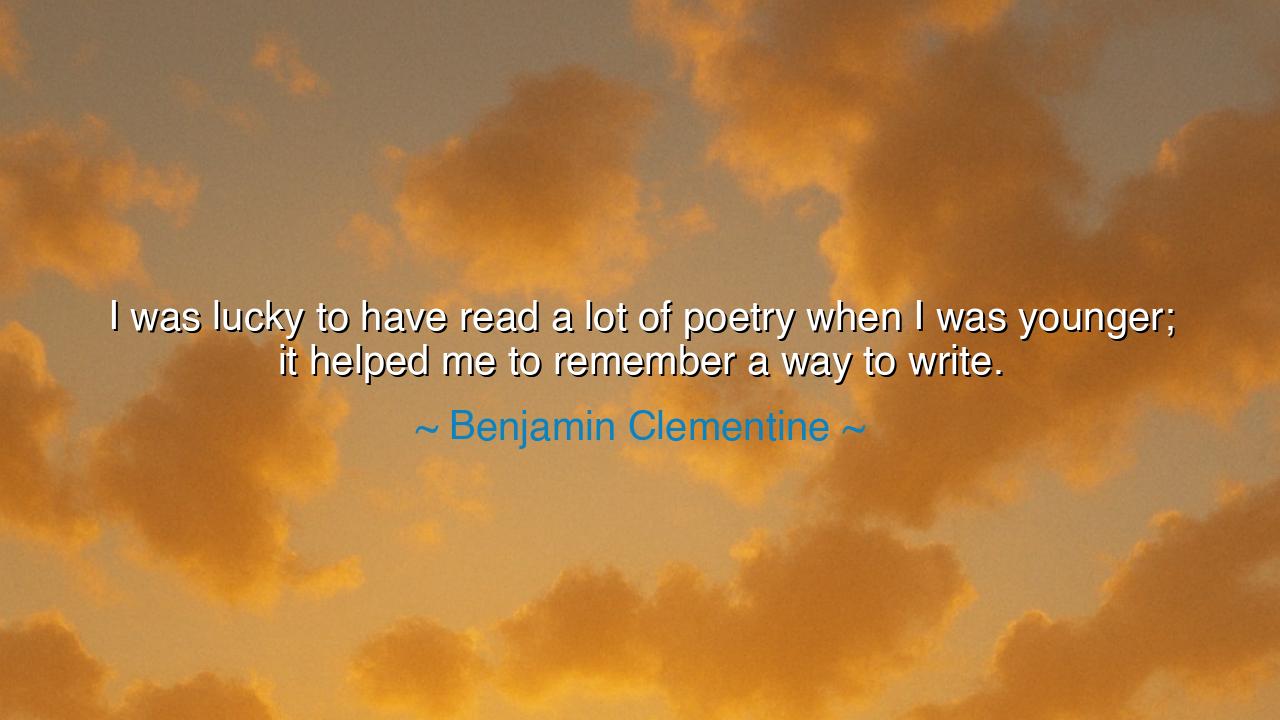
I was lucky to have read a lot of poetry when I was younger; it
I was lucky to have read a lot of poetry when I was younger; it helped me to remember a way to write.






“I was lucky to have read a lot of poetry when I was younger; it helped me to remember a way to write.” Thus speaks Benjamin Clementine, the musician and poet whose life carried him from hardship to acclaim. In these words, he reveals a profound truth: that what we take into ourselves in youth can later serve as a compass, guiding us when the path is uncertain. For poetry, read in early years, becomes not just memory but method, not just entertainment but architecture of expression.
The meaning of this saying rests in the recognition that poetry is both seed and map. The verses Clementine consumed in his youth sank into his memory like roots into soil. Later, when he sought to express himself, those roots blossomed again, showing him “a way to write.” The rhythm, conciseness, and intensity of poetry had already trained his spirit to distill truth into words. Thus, poetry did not merely inspire him—it gave him a structure for creation, a skeleton upon which new flesh could grow.
The origin of this insight lies in the ancient tradition of memory itself. Long before books were common, cultures survived through the recitation of poems, chants, and songs. Young people were taught to learn verses by heart, for these verses carried wisdom, history, and form. To read or memorize poetry in youth was to equip oneself with the tools of thought and the cadence of speech. Clementine echoes this tradition: what the young heart absorbs becomes the older soul’s inheritance.
Consider the story of Abraham Lincoln, who as a boy in rural poverty devoured the few books available to him, including the King James Bible and works of poetry. Those rhythms and cadences shaped his mind. Later, as president in a time of civil war, when he sought words that could heal a fractured nation, it was the poetic power of those early readings that enabled him to craft the Gettysburg Address and his Second Inaugural. He too had remembered “a way to write” that was planted in him as a child.
The lesson is luminous: fill the mind and heart with beauty while they are young, for it will shape expression for a lifetime. A youth trained only in distraction will struggle later to speak with depth. But a youth who encounters poetry will learn how to hear silence, how to distill emotion, how to choose words that carry weight. What is taken in as early nourishment becomes a lifelong reservoir.
Practically, this calls us to action. If you are young, read poetry now—fill your days with it as one stores food for winter. If you are older, place poetry in the hands of the young around you, so that their minds may carry its fire. Do not worry whether they understand every line; the rhythm alone is enough to leave its mark. Later, in their moments of need, they will recall the shape of those words, and it will show them a way to write, to think, to live.
Thus the teaching endures: early encounters with poetry are not wasted hours, but treasures stored in the soul. Clementine’s gratitude reveals the gift he received: poetry gave him form, direction, and courage to write his own truths. Let us do the same—for ourselves and for the generations after us—so that when the time comes to speak, we too may have words that rise like remembered music from the depths of our being.






HHuyen
I’m intrigued by the interplay between reading and writing suggested here. Does Clementine imply that writing can be remembered and revitalized through the examples we consume early in life? I also wonder about the universality of this phenomenon—can someone who didn’t read much in youth still discover a way to write later, or does early exposure provide a foundational advantage that is hard to replicate? It raises questions about how art is internalized and transmitted across time.
ALHo Thi Anh Linh
This statement highlights the long-term impact of early artistic exposure. I wonder if the benefit comes from absorbing technique, emotional depth, or simply the habit of paying attention to language. Could there be a difference between casually reading poetry and studying it deeply in terms of its influence on one’s writing? I also question how accessible this kind of formative experience is—does it depend on opportunity, environment, or mentorship?
TNNguyen Thao Nhi
I feel inspired by the idea that poetry can serve as a kind of memory or guide for writing later on. Does this mean that reading acts as a rehearsal for creating, embedding structures, metaphors, and emotional resonance into the mind? I also wonder whether Clementine’s experience applies to all forms of writing—could reading extensively in youth, whether poetry or prose, provide a blueprint that artists unconsciously draw upon when they create?
TKVI THANH KIEN
This makes me reflect on the formative power of early exposure to literature. I wonder whether reading poetry at a young age shaped not just his writing style, but also his perception of language and rhythm. Could it be that early engagement with expressive language provides tools for creativity that remain with a person throughout life? I also question whether this suggests that reading widely is essential for developing a unique artistic voice.